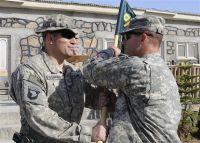WASHINGTON, Jan. 5, 2011 — U.S. troops and Afghan security forces serving in eastern Afghanistan are displacing the Taliban, making room for economic growth and governance, a task force commander serving in the area said today.
Army Col. Andrew Poppas, commander of Task Force Bastogne and the 101st Airborne Division’s 1st Brigade Combat Team, briefed Pentagon reporters during a video teleconference from his headquarters at Forward Operating Base Fenty in Jalalabad, the capital of Afghanistan’s Nangarhar province.
Task Force Bastogne conducts combined aggressive operations throughout its area of operation with the Afghan army, the border police and the national police, Poppas said.
“Kinetic operations tend to overshadow the herculean efforts that are being made to establish long-term stability through governance and development,” the colonel said.
Poppas’ 3,800-soldier brigade deployed to Afghanistan in May. The brigade’s mission is to fight insurgents and bolster governance and development in Nangarhar, Kunar and Nuristan provinces.
Integrated into the task force plan are two provincial reconstruction teams, three agribusiness development teams and 10 district support teams, “all of which have been able to make demonstrable progress in over 40 districts and municipalities” in the three provinces, Poppas said.
The colonel described positive achievements in 2010 in district and provincial governance and in economic development, including success at the “Torkham Gate.”
Torkham — a border town in Nangarhar linked by a highway with Jalalabad to the west and Peshawar to the east — is the busiest port of entry between Afghanistan and Pakistan, said Poppas, noting that it forms an economic corridor that runs through Jalalabad and all the way to the Afghan capital of Kabul.
“Revenue has come through the gate,” he said. “We’ve seen an increase in economic development [in] the area that runs through Jalalabad and then up toward Asadabad.”
Agribusiness has increased exponentially, he added.
Governance has progressed, Poppas said, with activities such as court trials and conflict resolution that promote the rule of law and reassure local populations about the reliability of provincial and, more recently, district legal authorities and government officials.
Evidence of strengthened governance also comes from the development and stewardship of a central government budget that provides budgetary guidelines for provinces and districts, the colonel said.
“I’ve already seen [such progress] within six months,” Poppas said, “and as we continue our operations under this umbrella of security that we’re providing, along with our [Afghan security forces] brothers, you’ll continue to see that development and governance progress.”
But fighting is not over in that part of the country, where the provinces for which the task force is responsible share 250 miles of border with Taliban-infested regions of Pakistan, Poppas said. For years, he said, insurgents have used the remote and treacherous terrain of places such as Nuristan, on the southern slopes of the Hindu Kush Mountains, as safe havens.
In Bargi Matal, a district in northeastern Nuristan province, the Taliban occupied a local village to establish a base for planning and staging attacks.
“The [Afghan forces] led a combined operation called Operation Azmaray Fury to take back the village,” Poppas said, “establishing security throughout the entire district that has been in place for over five months now.” Afghan forces have maintained that security without the presence of coalition forces, he added.
Another combined effort, Operation Strong Eagle, took place early in the summer in Kunar province’s Marawara district.
“This Afghan-led operation succeeded in defeating the enemy,” Poppas said, and the provincial government now leads development projects that will limit the freedom of movement of the insurgents and build the population’s confidence.
In his region of responsibility, Poppas said, the local people are very positive.
“The people themselves, as you engage with them, as you talk with them, as you walk through the markets and you get a sense of how they feel about it, it’s extremely positive in most areas that I dealing with,” he said.
“So I do think there’s a light at the end of the tunnel,” Poppas said. “I think it’s sustainable, because of a lot of the mentorship and stewarding we have done previously, and we’ll be able to start transitioning specific areas over to Afghan control.”
Source:
U.S. Department of Defense
Office of the Assistant Secretary of Defense (Public Affairs)

 von
von 
